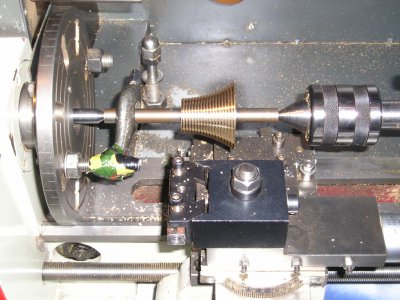- Joined
- Nov 21, 2010
- Messages
- 1,602
After digesting all of this, I am the lucky one. As a boy one of my bike pit stops was the well respected
Paragon Gear Marine Works. Had the Royalty to roam in there (uncle) worked there. As a kid the brain
multiplys things but I see white hair gold rim glasses with a loop aprons on, with rules and pencils in
pockets a million lathes shapers mills monster presses a foundry. Didnt own a Brownie yet but I still
can see it, wood oiled flooring old light globes hunter ceiling fans, black lunch boxes does anyone
remember at 12 noon, steam whistle could be heard for miles. My biggest problem "it didnt last long
enough". Im now a white head with a loop with ruler in pocket, dont know metrics (wasnt in our school)
dont have DROs maybe someday, old eyes. Then the root of winning 2 wars, those were the true
Rosey the riveters, B17 pilots had their lives entrusted right down to the machinist I know my uncle
was a machinist early 40s, army, one screwup somebodys life is at stake. He said it was a respected
job on the base even earned rank. So the machinist has to master man and machine has to come up
with impossible solutions and make those workable. Myself pushing a button then take a nap same
thing every day is just not me. Here I never know what walks through the door and usually a
challange at best. I must be Keith Fenners twin nothing new no high tech just brilliant solutions.
And I do not claim to be one but I have not yet said I cant do it. All has opions thats mine.
Paragon Gear Marine Works. Had the Royalty to roam in there (uncle) worked there. As a kid the brain
multiplys things but I see white hair gold rim glasses with a loop aprons on, with rules and pencils in
pockets a million lathes shapers mills monster presses a foundry. Didnt own a Brownie yet but I still
can see it, wood oiled flooring old light globes hunter ceiling fans, black lunch boxes does anyone
remember at 12 noon, steam whistle could be heard for miles. My biggest problem "it didnt last long
enough". Im now a white head with a loop with ruler in pocket, dont know metrics (wasnt in our school)
dont have DROs maybe someday, old eyes. Then the root of winning 2 wars, those were the true
Rosey the riveters, B17 pilots had their lives entrusted right down to the machinist I know my uncle
was a machinist early 40s, army, one screwup somebodys life is at stake. He said it was a respected
job on the base even earned rank. So the machinist has to master man and machine has to come up
with impossible solutions and make those workable. Myself pushing a button then take a nap same
thing every day is just not me. Here I never know what walks through the door and usually a
challange at best. I must be Keith Fenners twin nothing new no high tech just brilliant solutions.
And I do not claim to be one but I have not yet said I cant do it. All has opions thats mine.


